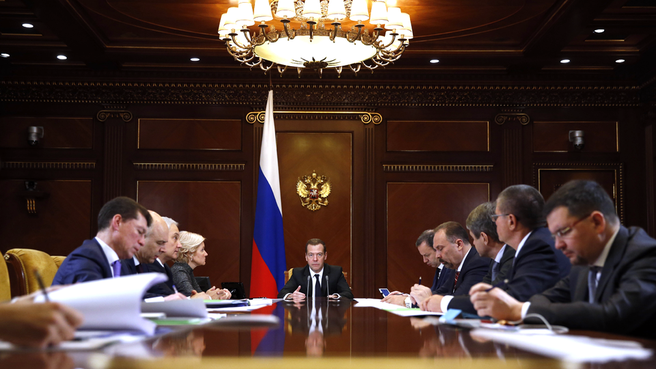Dmitry Medvedev: “The anti-crisis plan for this year is nearing completion. The plan’s targets have been achieved. We’ll concentrate our efforts on developing the most important or the most vulnerable sectors, such as transport engineering and manufacturing, housing construction, the auto industry, light industry, and agriculture. These sectors have great potential both in terms of import substitution and in terms of the aggregate effect they can make.”
FromDmitryMedvedev’sopeningremarks:
The government’s anti-crisis plan, or the plan of priority measures to ensure sustained economic development and social stability, this year has achieved its purpose. It has, for the most part, made it possible to neutralise the [negative] external impacts on the economy.
As a result, we have focused our resources on supporting the most vulnerable areas both in the economy and in the social sector. We have supported the processes of import substitution, and, even with extremely low oil prices and the extension of anti-Russian sanctions, were able to achieve some good results.
The government made 170 decisions and 15 federal laws were approved.
The plan was instrumental in preserving a significant level of support for the non-financial sectors and the social sector. The mechanism of subsidising interest rates for companies that implemented import substitution projects has proved effective. The financing of innovative projects that were carried out by various companies has been maintained at a relatively acceptable level. Measures to provide additional funding to credit companies has stabilised the banking sector, the outflow of deposit accounts was replaced by an inflow, and credit activity has been restored to an adequate degree.
The project financing programme allowed us to support specific investment projects at lower interest rates. Agriculture support measures have on the whole created acceptable growth in the sector under the present circumstances: about 3 percent from January through October. It will not significantly change before the end of the end. Stimulation of economy-class housing construction credit programmes has proved to be an effective anti-crisis measure. About 175,000 mortgage loans were issued at a subsidised interest rate, worth over 300 billion roubles.
The plan’s targets have been achieved. This is not to say, however, that we will stop working in areas identified in the anti-crisis plan. We’ll concentrate our efforts on developing the most important or the most vulnerable sectors, such as transport engineering and manufacturing, housing construction, the auto industry, light industry, and agriculture. These sectors have great potential both in terms of import substitution and in terms of the aggregate effect they can make.












